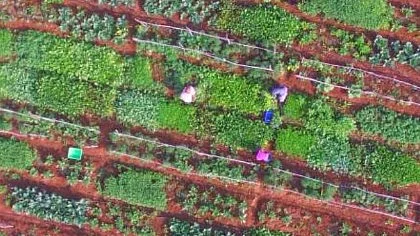If you're among the millions playing the virtual farming game Farmville, waking up in the middle of the night to harvest your tomatoes, chances are this may be your calling.
A Bengaluru-based startup is trying to replicate that same magic on a real farm, where users can harvest fruits and vegetables.
Today’s consumer has no access to safe chemical-free organic food, and there is no income predictability for farmers, said Shameek Chakravarty, co-founder of Farmizen that allows users to rent mini farms.
If you try to do organic farming on your own in balconies and terrace gardens, there is a problem of space and time. On the other hand, farmers are also facing production and distribution problems with no fixed income, which is leading to distress.Shameek Chakravarty
From Farm to Fork
Farmizen is connecting these two ends of the value chain on one platform via an app. Launched last year, the startup obtains farmlands by entering into a rent-share agreement with the farmers and allows users to rent a portion of land via the app by paying a monthly subscription fee.
A typical mini farm is 600 sq meter in size and a customer pays a fixed fee of Rs 2,500 per month.
The subscription allows users to choose from 15 set of crops they wish to grow on the rented plot or can also customise the crop they want to grow on the plot of land. Users keep a tab on the progress of their farm via the app and once the produce is ready they can either harvest on their own or can get it home-delivered the same day.
There is no storage required as produce typically reaches the customers in 5-8 hours after it is harvested.Shameek Chakravarty
The move also keeps the cost in check as there are no storage costs and there is no wastage of produce.
Many families come to the farm to work with farmers, sow seeds and even harvest their produce, adds Chakravarty. “They even come for picnics. Our model allows them to do all this with out the liability of owning and maintaining a plot,” he said.
Sushila Satish, a homemaker was interested in organic farming, but couldn’t pursue her passion for lack of space. Farmizen lets her do so and eat organic produce every week.
Now I am able to grow 12 different types of vegetables and we can also visit our mini farm whenever we want.Sushila Satish
Fixed Income for Farmers?
While Farmizen takes care of technology, quality seeds, organic fertilizers, marketing and delivery of the harvest, farmers provide labour, supervision and maintenance of the farm.
Chakravarty adds that typical farmer grows about 2-3 crops, now they grow upto 20 different varieties of crops using natural methods. “This also improves the quality of soil and its productivity increases,” he adds. The farmer also gets a fixed income from the plot.
“Earlier we used to earn about Rs 30,000-40,000 per month from 1 acre of land with no guarantee, but now that has gone up to Rs 1 lakh a month. We also don’t have to worry about marketing any more,” adds a farmer, Narayan Reddy, who’s tied up with Farmizen.
Farmizen currently manages five farms of about 10.5 acres. Subscription has also been growing at a steady pace...from 79 in June last year to about 340 till date.
Not The Pioneers
This is not the first time that a startup has tried to replicate the magic of Farmville in real life.
The model is similar to one followed by Tokyo-based startup Telefarm, which connects consumers with farmers and allows them to grow the agricultural organic crop and let them harvest. It charges a fee from the customers based on the type of crop they want to grow and time of cultivation.
Similarly, an Indonesia-based startup iGrow connects investors with farmers. In iGrow, investors choose the crops to be grown and once it is harvested they share the benefit with the farmers post the sale. Such ventures have been able to attract investor interest too. While Telefarm is backed by Japanese e-commerce giant, Rakuten, iGrow has also raised seed funding from East Ventures and 500 startups.
Farmizen has also been able to attract investors in just three months after its launch. It raised an undisclosed amount in seed funding from venture capital firm Venture Highway, Indifi co-founder Alok Mittal, founders of gaming portal adda52.com Mohit Agarwal and Anuj Gupta, and from few other angels.
(This article was first published on Bloomberg Quint.)
(At The Quint, we question everything. Play an active role in shaping our journalism by becoming a member today.)
